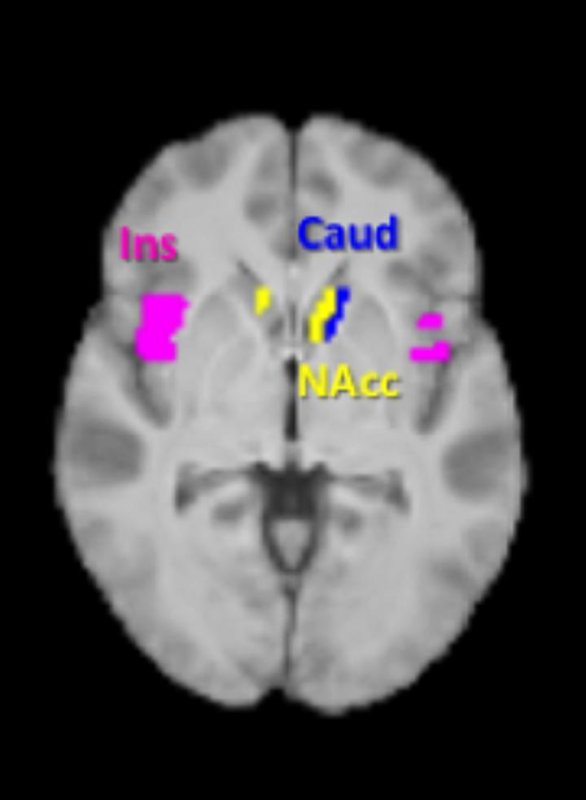The areas marked in blue and yellow -- called the caudate and the nucleus accumbens -- are linked to food cravings, but showed reduced activation to high-calorie foods when the volunteers took a propionate food supplement, researchers at Imperial College London report in a recent study. Photo by Dr. Tony Goldstone/Imperial College London
LONDON, July 1 (UPI) -- A supplement of a substance made by bacteria in the stomach may reduce cravings for junk food, according to a recent study.
People who consumed a propionate supplement showed less activity in parts of their brains connected to cravings, and ate less food when offered an unlimited amount during a meal, researchers in England report.
Propionate is made by bacteria in the gut after they digest the fiber inulin, which researchers say can signal the brain to reduce appetite.
When supplied to participants in a recent study at levels much higher than what is normally produced by the microbiota, or population of microorganisms, of the gut, they showed less desire for foods associated with cravings, as well as eating less.
"We developed inulin-propionate ester to investigate the role of propionate produced by the gut microbiota in human health," Dr. Douglas Morrison, a researcher at the University of Glasgow, said in a press release. "This study illustrates very nicely that signals produced by the gut microbiota are important for appetite regulation and food choice. This study also sheds new light on how diet, the gut microbiome and health are inextricably linked adding to our understanding of how feeding our gut microbes with dietary fiber is important for healthy living."
For the study, published in The American Journal of Clinical Nutrition, researchers gave 20 healthy, non-obese men an MRI after they drank a milkshake containing either inulin-propionate ester or a control level of inulin.
The men given the ester showed less activity in parts of their brain linked to cravings, and expressed less desire for foods such as doughnuts and pizza when showed pictures of junk food.
In a second part of the experiment, the men were given bowls of pasta with tomato sauce and asked to eat as much as they wanted. Men who had the ester ate 10 percent less pasta than those given the control level of inulin.
"Our previous findings showed that people who ate this ingredient gained less weight -- but we did not know why," said Dr. Gary Frost, a researcher at Imperial College London. "This study is filling in a missing bit of the jigsaw -- and shows that this supplement can decrease activity in brain areas associated with food reward at the same time as reducing the amount of food they eat."















